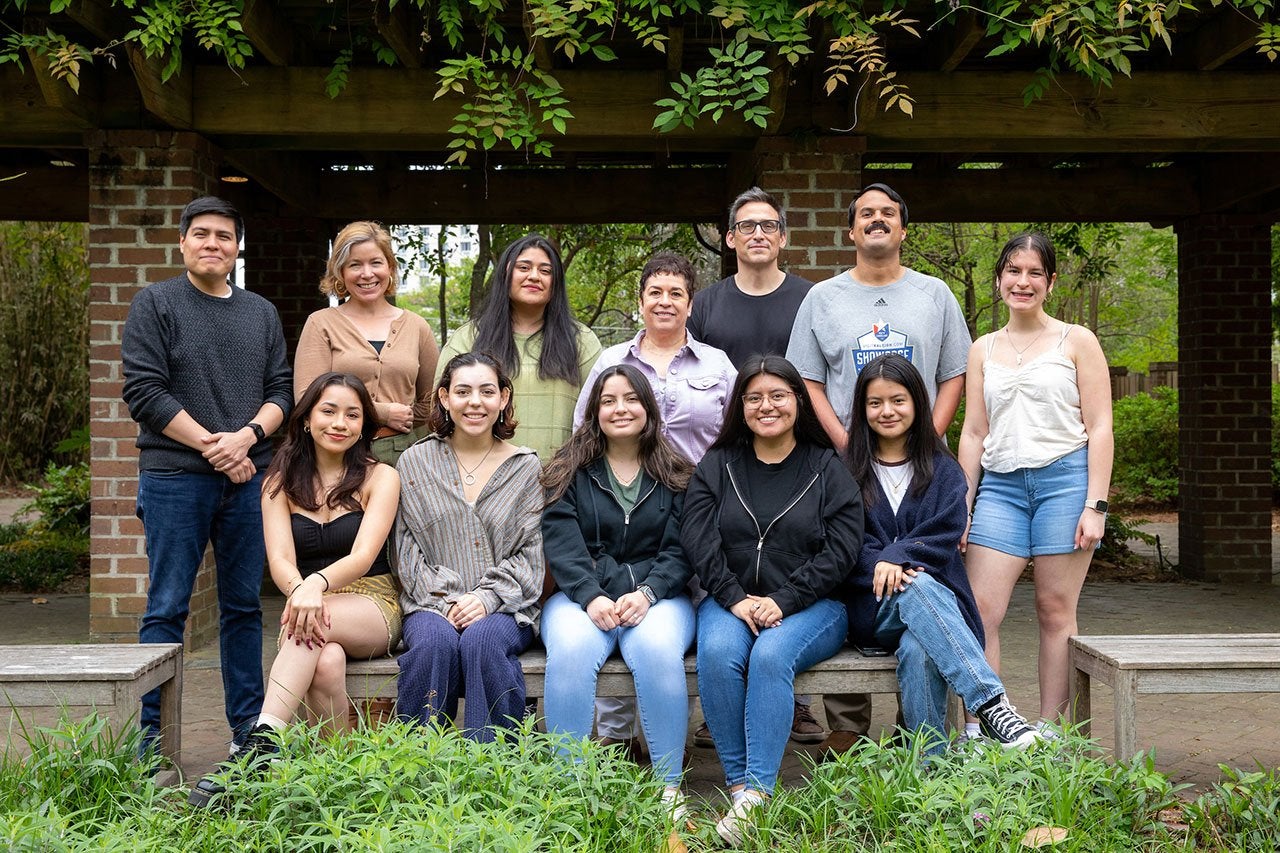Above: The first cohort of students and faculty participating in the new Spanish as a Heritage Language Distinction Program.
Silvia Rodriguez Sabater, associate professor of Hispanic studies, was thinking about equity and inclusion when she had the idea to create the Spanish as a Heritage Language Distinction (SHLD) Program at the College of Charleston.
“Being in the Department of Hispanic Studies, I thought about what we were doing for our Latino students, because we don’t have many of them studying Spanish, and not all Latino students speak Spanish, but many of them do as a home language, which is known as a heritage language,” says Sabater. “I thought we need to do something with them, to bring them to the department, so that they improve their Spanish and they feel included.”
So, she took a weekend to write a proposal and handed it off to the chair of the department, Michael Gómez. He trusted her enthusiasm and energy as an instructor, and they launched SHLD in the fall 2022 semester. As of March 2023, they now have 27 students enrolled in the program and a mentor group of CofC professors which includes Daniela Meireles, Susan Divine and Nadia Avendaño.
To participate in SHLD, students must take 12 credit hours of Spanish courses (including SPAN 312 and 412), involve themselves in the Spanish-speaking community through service learning or an internship and participate in Latino or Spanish groups on campus. Through its requirements and related opportunities and activities, students increase their understanding of their own bilingual and bicultural heritage, as well as how this heritage fits into the overall mosaic of Hispanic/Latino cultures, while perfecting their advanced Spanish language skills for personal and professional enrichment.
“In Spanish 312, we work out a lot with identity and culture and what it is to be a multicultural and multilingual person in the United States. Before the class, they may not know anyone on campus like them, but now they do, and we are creating a community at the College,” says Sabater, noting that in Spanish 412, the students focus on developing academic and business language in Spanish that will help them in future employment or post-graduate education.
“As a heritage speaker of Spanish who has participated in the distinction program, I highly recommend it to other Latino students who share a similar background,” says Mauricio Moreno-Garcia, who is double-majoring in psychology and Spanish. “The program offers a supportive community of peers who share similar experiences, making it an ideal space for students to connect and share their stories.”
Much of the enrichment comes outside the classroom, too. Students volunteer with organizations such as bilingual immigration law firm Cano Law or civil rights organization SC Migrant Education. These experiences further develop Spanish competency through authentic communication.
“This volunteer work allows students to apply their language and cultural knowledge in a meaningful way, while also contributing to the betterment of the community,” says Moreno-Garcia.

‘Yo No Soy Tu Perfecta Hija Mexicana’ is one of the book selections read as part of the program’s Hora de la Limonada. (Photos by Catie Cleveland)
Students also join campus groups like the Hispanic Latino Club, Spanish Club or La Casa Hispana. Sabater also leads Hora de la Limonada, an hour for students to practice Spanish and a Spanish book club. This semester the students are reading Yo No Soy Tu Perfecta Hija Mexicana (I Am Not Your Perfect Mexican Daughter).
“Many of the students had never read an entire book in Spanish and were intimidated, but they proposed we start a book club,” she says. Now they meet once a month to discuss the book in Spanish.
“Sylvia does an incredible job creating community,” says Gómez. “From Spanish 312 to Hora de la Limonada to the book club, it’s just incredible.”
“I’ve never been hugged as much by the students because they say, ‘Finally, I have a place on this campus. Thank you very much for creating this opportunity so that I can meet with other students,’” says Sabater. “That is probably my favorite part of creating this program.”





